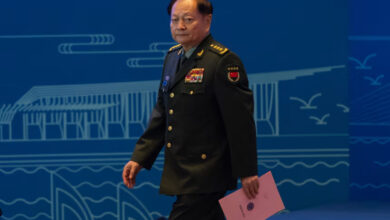Prime Minister Essam Sharaf announced a reshuffle of governors that included appointing 11 new governors and transferring another four to different governorates.
Besides another wave of army generals taking on positions, the new appointments also include journalists and academics.
New Sharqiya Governor Azazy Mohamed Azazy is a literature scholar and a career journalist who has held positions at the Nasserite Al-Karama and Al-Araby papers. Azazy was a founder of the Arab Socialist Party and a member of the General Secretariat of the Arab Democratic Nasserist Party in 1992. He is a founding member of the Karama Party and was its media secretary in 2009. He was also a member of the coordination committee of Kefaya. He is a member of the Coalition of Egyptians for Change, the National Committee for the Defense of Suleiman Khater, and the Committee for the Defense of Egypt’s Revolution.
Osama al-Fouly, the new governor of Alexandria, is an academic. Dean of the Faculty of Law at Alexandria University, he worked as a financial and legal adviser to the Central Bank of Kuwait from 1993 to 1996. He was appointed first deputy for international organizations’ affairs at the Ministry of International Cooperation in 2000, before becoming head of the European Cooperation Sector. Responsible for economic cooperation between Egypt and some 44 European countries, he also headed and participated in delegations representing Egypt in international negotiations and agreements. He was appointed chairman of the economy and public finance department at Alexandria University in 2001 and was a representative of the National Investment Bank in the board of directors for the Alexandria Commercial and Maritime Bank between 2000 and 2004.
Several political powers said they reject the appointment of Fouly and his deputy, calling the appointment a “setback not much different from the appointment of former governor Essam Salem.” The Civil Democratic Coalition said it rejects Fouly because he was a member of the formerly ruling National Democratic Party (NDP) and appointed dean of Alexandria University’s Faculty of Law when the State Security Investigative Services (SSIS) was controlling such appointments. The coalition accused Fouly of helping rig the results of the Teaching Staff Club elections.
Serag Eddin al-Rouby, new governor of Minya, has a more traditional security profile. He is a security expert and an international attorney. He has been a lecturer at police academies, and was vice president of the International Criminal Police Organization in France. He was the head of Egypt's Interpol and the military prosecutor for the Egyptian police at the Interior Ministry between 1993 and 1999. He was also a criminal investigator at the Public Security department from 1984 to 1993.
The April 6 Movement said the appointment of a military man in Minya was unexpected, but that they will cooperate with him.
Major General al-Sayyed al-Boraie, new governor of Assiut, was awarded the Sinai Star – the supreme military medal – for his role in the 1973 war with Israel. He has worked as deputy governor of the 6th of October governorate.
Mohamed Mokhtar al-Hamalawy, Giza governor, was deputy governor of Cairo. He worked in municipalities until becoming head of Benha’s local council and a secretary for the governor of Qalyubia.
Major General Salah al-Maddawy, governor of Daqahliya, was also deputy governor of Cairo. A graduate of the Military Technical College, he has held military leadership positions and participated in the 2010 parliamentary elections.
Major General Tareq al-Mahdy, governor of Wadi al-Gadid, was given responsibility for Egyptian state TV after the resignation of former information minister Anas al-Fiqqi during the 25 January revolution, later becoming a member of the board of trustees of the Egyptian Radio and Television Union. Mahdy worked in Air Defense and became the Chief of Air Defense Staff in 2005. He then worked as an assistant to the chief of the general staff and is now a member of the Supreme Council of the Armed Forces, which has ruled the country since Hosni Mubarak resigned from the presidency in February 2011.
Residents welcomed the appointment of Mahdy for his good reputation and the role he played in solving problems at the Radio and Television Union. Some have said Mahdy was removed from his state TV position because of his popularity among the staff there.
In Kafr al-Sheikh, the Wafd Party, the April 6 Movement and the Coalition of Revolution Youth said they refuse to accept that their governor will remain in office, and will stage a sit-in outside the governorate headquarters on Monday. Governor Ahmed Zaki Abdeen has survived four gubernatorial reshuffles.
In Beni Suef, residents were generally relieved by the removal of Maher al-Demiaty, who was largely considered a remnant of the NDP. The appointment of Maher al-Zaher Beibars there was well recieved as he is seen as having an honorable profile.
In Qena, there were mixed responses to the return of Adel Labib, who served as Alexandria governor after leaving Qena and who some consider to be the architect of Qena's modern face.
Some political powers said Labib’s appointment was a step back and revolutionary youth groups called for a protest before the governorate’s headquarters on Saturday. Dozens from the Coalition of Revolution Youth, the Jama’a al-Islamiya and some Salafis protested on Friday against his appointment. They chanted, “Why Adel Labib again? Is Hosni Mubarak coming back?” and “Down, down with the Governor who worked with State Security!” Mostafa al-Gales, a member of the Revolution Youth Coalition in Qena, said Labib is rejected as an NDP member and for his cooperation with the SSIS. He accused Labib of being responsible for the death of Sayyed Belal, allegedly tortured to death by the SSIS in Alexandria in January. He said a civilian governor is needed.
Meanwhile, presidential hopeful Mohamed ElBaradei criticized the appointment of governors employed by the police and army. He said an intellectual revolution is needed, not one that merely changes people.
On Twitter, he said, “18 of Egypt's 27 governors are major generals and they are all Muslims. Revolution is about changing our way of thinking, not people. When are we going to get started?” He also commented on the lack of women among governors.
An Egyptian government official said the reshuffle did not measure up to expectations. He said the removal of more governors was expected but several candidates either declined appointments or were rejected by certain bodies, so some governors had to remain in their positions.
The same official said Sharaf and Minister of Local Development Mohamed Attia tried to satisfy the revolutionary youth and residents by removing Assiut Governor Ibrahim Hammad and Daqahliya Governor Mohsen Hefzy.
They also removed Governor of Qena Adel Mikhail for this reason. Mikhail's appointment had stirred tensions in Qena that led to a sit-in, where people entertained the idea of having governors elected and not appointed. The idea, however, didn't register in the country's current political transition.
Translated from the Arabic Edition




